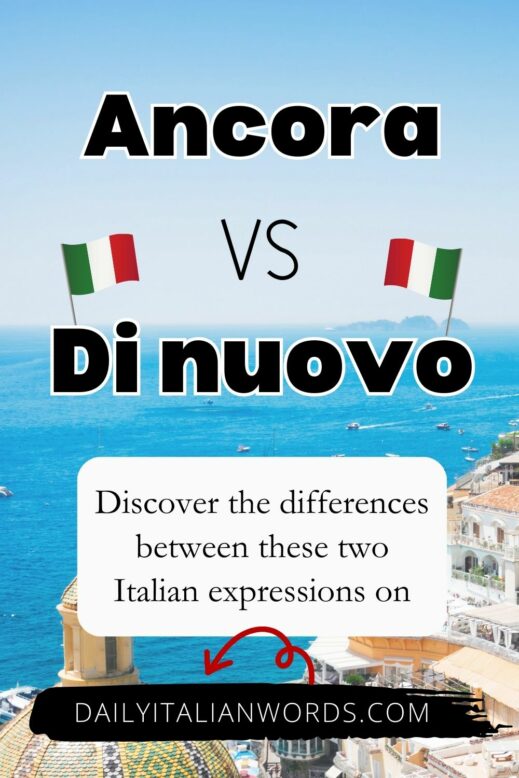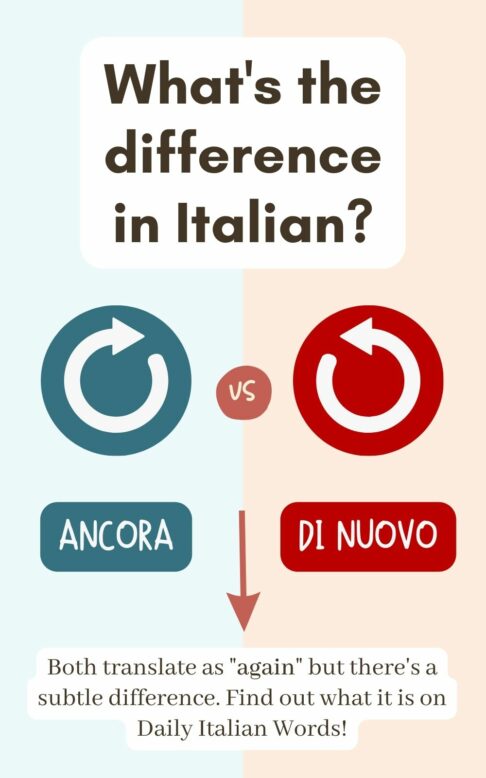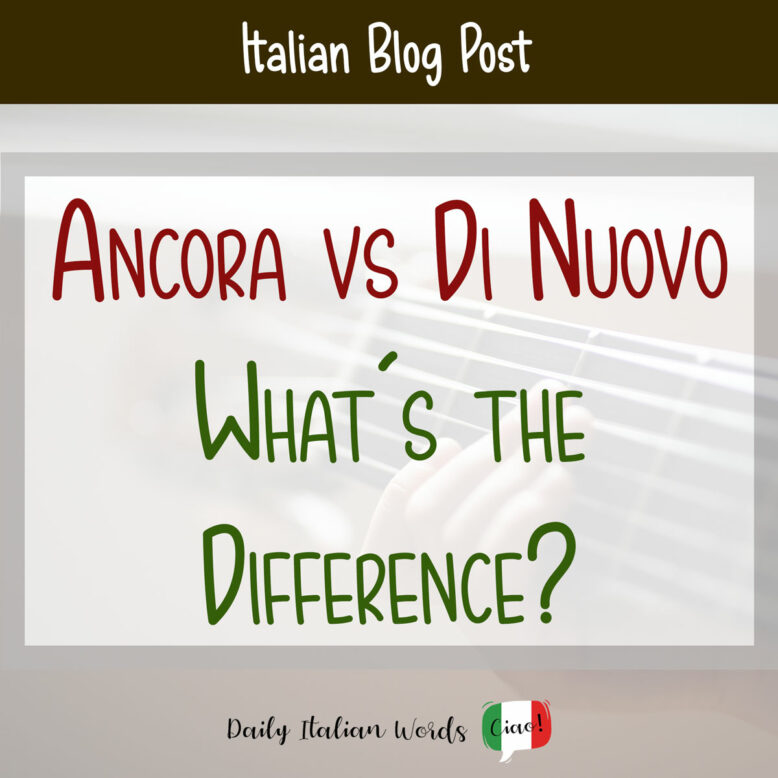Students of Italian often find themselves feeling confused about when to use ancora versus di nuovo since both can be translated with the word “again”. In this article, we attempt to shed some light on the differences in their usage.

How to Use “Ancora” in Italian
Before we delve into ancora as a translation for “again“, it is important to stress that this isn’t the only translation for this word, nor is it the most common.
Ancora = Still
Ancora is actually the primary translation for the adverb “still”. It is used to refer to something that began in the past and is continuing into the present. Note that ancora comes after the verb in Italian.
Lucilla abita ancora a Milano.
Lucilla still lives in Milan.
Sei ancora alla stazione?
Are you still at the station?
Ancora, like “still”, may also refer to something that wasn’t true in the past, and continues to be untrue in the present.
Non ho ancora fame.
I’m still not hungry.

Ancora = Yet
You will see ancora used in statements referring to something a person is expecting to happen, but hasn’t happened so far, just like the English adverb “yet”.
Non abbiamo ancora finito.
We haven’t finished yet.
Note that in negative statements like this, it is possible to replace “yet” with “still” in English, with the only difference being that the “still” sentence is imbued with a sense of impatience while the “yet” sentence is not. In Italian, this subtle difference can’t be expressed with ancora alone, so other means must be used to communicate impatience such as intonation and gestures.
Non siamo ancora arrivati.
We haven’t arrived yet.
We still haven’t arrived.
You can also use ancora and “yet” to emphasise an increase or repetition of something.
Ho fatto ancora un altro sbaglio.
I made yet another mistake.

Ancora = More
Ancora is often used to mean “more” when referring to an additional amount of something. You will often see it in the company of the particle ne meaning “of [something]”.
C’è ancora della torta. Ne vuoi ancora?
There is still some cake left. Do you want some more (of it)?
Ancora = Even
Ancora can translate as “even” when it is used for emphatic purposes. Here are some set expressions in which you will see it used.
- ancora oggi = even today / now
- ancora meglio = even better
- ancora peggio = even worse
- ancora prima = even earlier / before
- ancora di più = even more
Ancora oggi non mi piace parlarne.
Even now I don’t like talking about it.

Ancora = Again
Finally we come to ancora as a translation for again or once again. It is always used to refer to an action that is repeated once or multiple times.
Leggiamolo ancora!
Let’s read it again!
Grazie ancora per il tuo aiuto.
Thank you again for your help.
Dario è stato licenziato. – Ma, ancora?
Dario was fired. – What, again?
When “again” is the translation, ancora is often followed by una volta (lit. one time). The meaning is exactly the same.
- Leggiamolo ancora una volta! = Let’s read it again!
- Ti ringrazio ancora una volta per il tuo aiuto. = I thank you again for your help.

How to Use “Di Nuovo” in Italian
If you were worried about having to read another long chapter about the various meanings for di nuovo, you can breathe a sigh of relief: di nuovo has just one meaning which is “again” or “one more time”.
Whenever ancora means “again”, remember that you can safely replace it with di nuovo.
Facciamolo di nuovo!
(Facciamolo ancora!)
Let’s do it again!
Giovanni è caduto di nuovo.
(Giovanni è caduto ancora.)
Giovanni fell down again.

Keep in mind, however, that while ancora can always be replaced by di nuovo when it means “again”, the opposite does not apply. In other words, you cannot always replace di nuovo with ancora, especially if the presence of ancora causes ambiguity. For example:
Gli piacciono di nuovo i cani.
He likes dogs again.
If we were to replace di nuovo with ancora in the previous sentence, it would immediately be interpreted as “He still likes dogs” rather than “He likes dogs again“. In other words, ancora would suggest that he never stopped liking dogs, whereas di nuovo tells us that he stopped liking them for a while, and then started liking them again.
Note: A synonym for di nuovo is nuovamente. There is no difference in meaning but the latter has a more formal feel to it (e.g. Mi scusi se la disturbo nuovamente = I’m sorry for bothering you once again).
The third option: “Un’altra volta”
Yes, there is a third wheel in this equation, and its name is un’altra volta which can mean either “once again” or “another time”. Italians often prefer this term to ancora and di nuovo, perhaps because it leaves less room for ambiguity.
Mi piacerebbe mangiare qui un’altra volta.
I would like to eat here again.
Mario ha ringraziato un’altra volta Michele per il suo supporto.
Mario thanked Michele once again for his support.


Heather Broster is a graduate with honours in linguistics from the University of Western Ontario. She is an aspiring polyglot, proficient in English and Italian, as well as Japanese, Welsh, and French to varying degrees of fluency. Originally from Toronto, Heather has resided in various countries, notably Italy for a period of six years. Her primary focus lies in the fields of language acquisition, education, and bilingual instruction.


